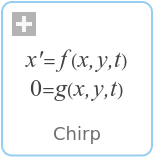WOLFRAM SYSTEM MODELER
ChirpAn external chirp function |
|
Wolfram Language

SystemModel["IntroductoryExamples.ExternalFunctions.Chirp"]

Information
This function defines a chirp signal in the form of an external function. A chirp signal is a sinusoid with a frequency that changes continuously over a certain band  and over a certain time period
and over a certain time period  :
:

The "instantaneous frequency"  in this signal is obtained by differentiating the argument with respect to time t:
in this signal is obtained by differentiating the argument with respect to time t:

And we see that it increases from  to
to  . When applying the signal to a system it gives a good control over the exited frequency band, it is therefore often used for system identification.
. When applying the signal to a system it gives a good control over the exited frequency band, it is therefore often used for system identification.
The following c-function is used in the model:
double Chirp(double w1, double w2, double A, double M, double time)
{
double y;
y = A * cos(w1 * time + (w2 - w1) * time * time / (2 * M));
return y;
}
For a step by step tutorial see Using External Code.
Syntax
Inputs (5)
| w_start |
Type: AngularVelocity (rad/s) Description: Angular velocity at start time |
|---|---|
| w_end |
Type: AngularVelocity (rad/s) Description: Angular velocity at end time |
| A |
Type: Real Description: amplitude of signal |
| M |
Type: Real Description: time period for signal |
| t |
Type: Real Description: time |
Outputs (1)
| y |
Type: Real Description: output signal |
|---|
